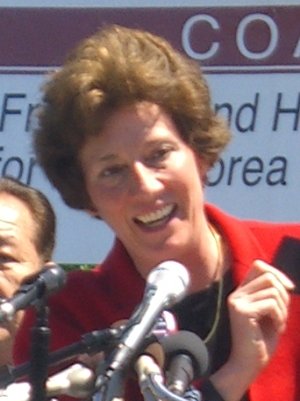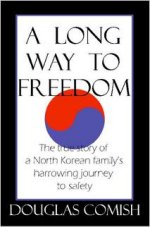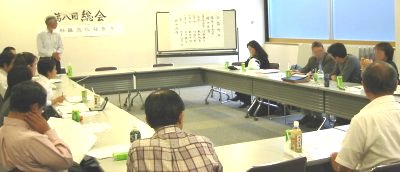Tag Archives: North Korean defectors
LFNKR Annual Report Released for 2011
Introduction
The new currency system initiated in November 2009 by North Korea has led to serious confusion in the country’s economy. As a result, poverty continues to deepen. Around November 2010, even in Pyongyang where relatively privileged people live, the supply of food has stopped. The currency revaluation slashed the currency to 1/100 of its previous value, but by March 2011, the price of rice per kilogram had risen to 1800 NKW. This is the same price it was before currency reform, and it indicates a complete failure of the government’s plan to suck money from its citizens.
Report on LFNKR Activities in FY 2007-2008
Annual Activities Report
Introduction
For the Beijing Olympics held in August 2008, the Chinese and North Korean authorities continued their strict crackdown on North Korean defectors in the border areas and in China. The crackdown was so strict that even the transportation of public supplies were mostly prohibited.
Nevertheless, the inflow of North Korean defectors into China has not stopped, although the scale of the inflow is smaller than that during the period from late 1990s to early 2000s. The Chinese government still arrests and repatriates North Korean refugees, knowing that these people will be severely punished if sent back to their own country.
International society still repeatedly protests the repatriations by the Chinese government. The UN special rapporteur on human rights in North Korea has not yet been allowed access to conduct a probe of human-rights conditions in North Korea.
However, as the abuse of human rights in North Korea have become more widely disclosed around the world, international pressures on the North Korean government have grown. For example, many nations have come to question the effectiveness of international food aid to North Korea and stopped responding to requests from the World Food Program (WFP). There has been a tug of war between North Korea and aiding nations, which have specifically stated that they would provide food aid on condition that the North Korean government allow them to establish monitoring systems to assure their food aid will be properly used.
Reports from LFNKR local staff
According to recent reports from local staff members working at LFNKR’s shelters in the border area and LFNKR local workers in North Korea, the aged and children are starving to death in a village area located three railway stations inland from Musan, North Hamgyong, and deaths from malnutrition and starvation are starting up again in Hamhun, South Hamgyong and Chonjin in North Hamgyong.
Even large, first-tier corporations employing 2,000 or more have had to suspend their operations because they cannot procure materials, meaning that they cannot provide their employees with food. LFNKR has handed food to those people who came to China intending to return to North Korea once they had food. During the past year, LFNKR has distributed more than 30 tons of food in the border area to these needy North Koreans.
Human Trafficking and Orphans with no Nationality
At least 60% of North Korean defectors are female, and most of them become victims of human trafficking. Many of them are sold as brides to farmers in inland China because the villages in inland China are suffering from a shortage of marriageable women. Since the Chinese government launched its reform and opening-up policy, many young Chinese women in villages have moved away to urban areas in China, the South China economic bloc, South Korea and Japan where they can earn good pay.
In the Yanbien Korean Autonomous Region, about 8,000 Korean Chinese have been flocking to South Korea each year to work away from home. To fill this void, the Han people have moved into the region from other provinces. The disappearance of the Korean Autonomous Region is considered only a matter of time.Many of the Chinese farmers to whom North Korean women are sold are incapable of making a living. Often they suffer from metal disorders, or have little sense of social responsibility. Hence, if their North Korea wives are repatriated, the Chinese husbands tend to abandon any children they have. This is why the number of children with no nationality is increasing yearly.
One of the major activities of LFNKR is to protect these abandoned children under its education sponsorship program. LFNKR is happy to see those foster children raised under the program and eventually resettled in South Korea, where they can enjoy satisfying lives, attend university or technical college, and happily marry.[Chronological list of major activities during the last fiscal year]
Summary of Major Activities
- Participated in Thai International Conference on North Korean Refugees and Human Rights in North Korea held on Sept. 17-21, 2007
- Helped Tokyo Bar Association with their research on human rights in North Korea (Sept. 19, 2007)
- Held discussions with Guard Division, Japan Coast Guard (Oct. 2, 2007)
- Participated in Global Festival held in Tokyo to publicize the North Korean refugee issue (Oct. 6-7, 2007)
- Initiated a rescue plan for North Korean defector, Ms. R, who contacted LFNKR requesting help (Nov. 2, 2007)
- Successfully protected North Korean defector, Ms. E (Nov. 8, 2007)
- Attended at the 50th anniversary of Arakawa No. 9 Junior High School where North Korean defectors who have settled in Japan attend night classes (Nov. 11, 2007)
- Participated in NGO conference during the North Korean Human Rights Abuse Awareness Week (Dec. 14, 2007)
- Participated in the conference held in Sendai (city in northern Japan) one of a series of events for the North Korean Human Rights Awareness Week (Dec. 16, 2007)
- Mr. Kato, executive director of LFNKR, spoke on the North Korean human rights issue as a guest speaker at Christian University in South Korea (Dec. 20, 2007)
- Interviewed by Prof. Vitit Muntarbhorn, the UN Special Rapporteur on NK Human Rights (Jan. 30, 2008)
- LFNKR received the family of a North Korean defector, Mr. K, who safely arrived in Tokyo (Jan. 30, 2008)
- Mr. Kato was a guest speaker at the international scholarly conference on North Korean human rights hosted by Christian University in South Korea (March 20, 2008)
- Mr. Kato was a guest speaker, at a public meeting hosted by Kanagawa Branch, the National Association for Rescue of Japanese Abducted by North Korea (March 23, 2008)
- Demonstrated with banners and placards protesting the North Korean human rights issue at the Olympics torch relay in Nagano, Japan (Apr. 26, 2008)
- Held discussions with NK & Beyond Missions International, a British NGO (June 6, 2008)
- Met with Open Radio North Korea
- Investigated development of a safe southern rescue route
Securing safety and protection of North Korean refugees
LFNKR has maintained a low-profile policy as much as possible in rescuing and protecting North Korean refugees. During the past year, no NGO humanitarian aid workers involved in LFNKR rescue activities has been arrested or held.
Most of LFNKR’s shelters, except for access points in the border area, are located in mountains to avoid the strict crackdown. LFNKR has supplied a total of about 20 tons of rice to more than 700 North Korean defectors and supplied about 500 sets of winter clothing and 2,000 pairs of socks to North Korean defectors.
One of LFNKR’s plans to help North Korean refugees wishing to settle in China is to help them acquire calves, so that they can raise and sell for profit. This should help the refugees become financially independent. This plan has been implemented at a few places in Jilin Province. So far, the plan has gone forward smoothly.
LFNKR has provided five North Korean refugee families (12 people) with protection until they reached safe places, and also helped one family (3 persons) to settle in Japan. LFNKR has assisted about 30 North Korean refugees in settling in South Korea. Among them are daughters of Japanese wives and the children of ethnic Koreans who originally lived in Japan.
Medical Aid
LFNKR distributed 350 family medical kits in North Korea. These medical kits were procured in China and Japan, and each kit includes pain killers, antiphlogistics, nutritional supplements, etc.
Educational Sponsorship Program
Currently, over 20 refugee orphans are protected under the LFNKR educational sponsorship program. Two new shelters have been added. The foster children under the program receive money to cover their living expenses and education expenses from LFNKR through its local staff responsible for the program. The foster parents are notified of how their foster children are doing by letters from the children or by LFNKR newsletters on an irregular basis.
Most of the foster children were born to Chinese men and North Korean women who were victims of human trafficking. These children have no “nationality” because the Chinese government continues to treat their mothers as illegal immigrants. Most of their fathers are incapable of making a living or are indifferent to raising children. Meanwhile, the Chinese authorities continue to arrest and repatriate their mothers, mothers who are trying to raise their children and therefore should be granted the legal right to stay in China.
It is a sad fact that the foster children are not allowed to have legitimate inhabitant registration certificates in China, so that cannot enter high schools or higher educational facilities, no matter how excellent their school record. Even if they try for a higher education, they are highly likely to be denied entry, and may even be arrested and repatriated. These children are abandoned not only by their parents but by the Chinese government as well. The number of such children now reaching school age continues to rise.
Assisting Settling in
LFNKR has worked together with other NGOs to help North Korean defectors reach safe places in third countries. LFNKR has helped a number of refugees settle in Japan when they have explicitly rdquested this by working together with related governmental divisions, NGOs, and the North Korean Refugee Support Center of the Korean Residents Union in Japan (Mindan).
Among the North Korean defectors who have settled in Japan, those who are aged or suffer from chronic diseases receive welfare benefits, while most young defectors relatively quickly graduate from welfare and start leading independent lives.
International lobbying
Especially significant among the international lobbying activities were the field survey of North Korean refugees in Thailand and the meetings with the Thai National Human Rights Committee, the Thai Ministry of Foreign Affairs, and the Chiangrai Immigration Bureau as well as police in the Thailand/Laos border area. We held discussions with them primarily on human rights and how to improve conditions at the overcrowded detention center.
American Peace Worker Honored in Seoul

FROM WALL STREET JOURNAL ASIA
September 10, 2008
North Korean human-rights abuses often go unnoticed, especially by South Korea, where past governments have preferred to ignore the brutal nature of the Pyongyang regime to the north. The awarding of the Seoul Peace Prize to American Suzanne Scholte last week therefore marks a welcome change.
Report on LFNKR Activities in FY 2006
Annual Activities Report
It is now obvious that North Korean defectors are being widely recognized and accepted as a legitimate issue by the international community. According to the resolution unanimously passed by the UN General Assembly last December, the UN special rapporteur on human rights in North Korea has been urging the North Korean government to correct its serious infringement of human rights and to allow the rapporteur entry into the country to investigate human rights there.
North Korea Freedom Week Slated for US Capital this April
From Suzanne Scholte, North Korean Freedom Coalition
Below is a list of the public events being held the week of April 22-29 to promote the freedom, human rights and dignity of the North Korean people. At the bottom of this page you will also find an invitation to Defense Forum Foundation’s Forum on Capitol Hill with North Korean Defectors on Friday, April 27. North Korea Freedom Week is just a few days away! Please help us promote attendance at these events by spreading the word.
International Symposium on North Korean Human Rights
Public Awareness Week
In June 2006, the North Korean Human Rights Law was established in Japan. This law specifies December 10-16 as the North Korean Human Rights Week and resolves that both governmental and regional institutions shall put forth efforts to increase public awareness of human rights violations by North Korea.
Report – What We Did in Fiscal Year 2005
Sept. 2004 to Aug. 2005
On Oct. 9, 2005, LFNKR held its annual General Meeting in Tokyo.
New Book: A Long Way to Freedom

A Long Way to Freedom is the story of one refugee family’s harrowing journey to safety, from a daring escape out of their own country, North Korea, to years of surviving their way over half a continent.
This is a tale of bravery, great fortune, and also terrible failures and defeat. It is an epic adventure of love, violence, danger, true friendship, and betrayal. But it ultimately ends in success, and a hard earned victory over unbelievable odds.
A Long Way to Freedom – (297 pages, Paperback or PDF)
By Douglas Comish






